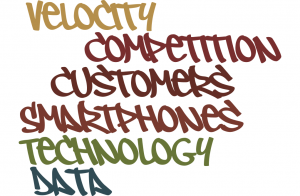Everybody talks about Analytics today. Analytics have become so popular that you will hear concepts like “data science” in popular TV shows, such as House of Cards, and I truly expect my grandfather to ask me what I think of big data just about any day now.
When I decided to major in Statistics, this is a (obviously random) sample of comments I got:
- Why don’t you study Math instead
- Why don’t you study Engineering instead
- Aren’t you going to be done with the degree after one class
- Are you planning to fill out mortality tables all day long for the rest of my life
- So you’re planning to move to Rome and work for the National Institute of Statistics and prepare for the census every 10 years
- Is that even a degree
However, I have to admit... my favorite was always the everlasting “you’ll learn how to win the lottery!”
What has changed in the past 14 years, now that everyone tells me “did you decide to study Statistics because you knew it would give you a 100% chance of having a good job?” (Although remember....there's no such a thing as an event with 100% probability!).
If one wants to be philosophical, we can say that everything and nothing has changed. If we want to be practical, I think a lot of things as changed in that practical world… just to name a few aspects that are obviously deeply connected to each other:

We (as customers) are all getting used to a world that is way faster. We also feel we are in control of it, thanks to the little device we hold in our hands. In return, we (as enterprises) have to take advantage of more powerful technologies and leverage on more data, to make sure we can properly and timely fight the competition.
This has changed SO fast. In 2006, I was studying at UC Berkeley and the first iPhone was just about to come out. I remember because we used to wonder what we'd do with it (oh, blessed ignorance). It was very rare to see someone walking on campus heads down on their phones; to go on Facebook we typically logged into a café’s Wi-Fi. We actually needed a phone plan that included minutes and SMS!
In the companies, these changes are supported by the introduction of new powerful technologies, and the increase of data availability about and from our customers. However, we don’t need an algorithm to tell us that:
![]()
And here we are! Analytics are the key element that can get us through the labyrinth of data, leverage on the technology, so that we're able to find the needle that we can call a piece of RELEVANT information. And the only way to extract this information is by putting this Analytics truly into action... or they just stay a theoretical exercise.
Aside from data and technology (and despite what some will tell you) people in your company are essential to achieve this. Raising data scientists and business experts who know how to use analytics to extract value from your own data and translate this value into business actions is an essential aspect of this ongoing change. Never think again that your analyst is that weirdo that sits alone in a room by himself just crunching data that nobody understands! The real value of what he or she does is reflected upon the ability to translate analytics into actionable business.
At SAS, we have developed an approach to support your path through putting analytics in action. This approach is supported by both practical use cases that reflect into industry applications, as well as a set of technologies and expertise that can help you fast track through applying analytics in action, supported by proper workshops and assessment processes when needed.
The process is simple, three steps only and we want to help you put them in place, but also connect them to each other:

The practical use cases help you find specific areas that are, in fact, actionable for your business: from performing data management to get your data rolling for analytics, to make analytics approachable to everyone, and up to taking advantage of analytics to make decisions at scale or execute them in streaming (so to really take advantage of those smartphones we keep using!).
If you’re curious to hear more, don’t hesitate to contact me or one of your local SAS experts, and read more in our annual report , on our website or in the Analytics In Action blog series, such as Text Frontier and Subconscious Musings, and stay tuned for future events and webinars!
